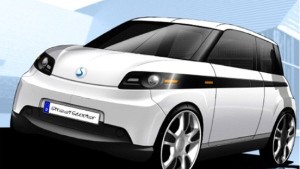A chim Kampker is only 34 years old. He is likely to be by far the youngest boss of a German automobile company – and probably this superlative even applies to the entire car industry around the globe. Granted: The Kampker founded Streetscooter GmbH in Aachen has almost nothing in common with the big companies like Volkswagen, Daimler or BMW. Not a single car has produced the small company so far. Nevertheless, Kampker wants to offer from the coming year to the major automakers the forehead.
The young man heads the Chair of Production Management at the renowned RWTH Aachen University. Together with several other professors of other disciplines and about two dozen partners from the predominantly medium-sized industry, including the Thyssen Krupp Group, he has set himself an ambitious goal: By spring of next year, the prototype of a novel electric car to emerge.
Admittedly, that too is not exactly a unique selling point. In Germany alone, in addition to the large corporations, there are still at least three entrepreneurs who want to launch an electric car soon: There is the Essen-based energy service Roman Dudenhausen, who took over the electric car division of the French supplier Heuliez with the battery-operated city car “Mia” in the summer ; there is the Porsche refiner reputation from the Lower Allgäu with his electric sports car “eRuf”; and there are the founders of the Jena-based company Innovative Mobility with its electric single-seater called “Kolibri”. Despite the numerous competitors, Achim Kampker is sure that one day he will prevail. Because his electric car “street scooter” should be without any frills, especially one – affordable.
“We want to build an affordable, functioning electric car – which nevertheless drives safely and reliably,” he says. Ultimately, the street scooter will one day be built in six variants – from flatbed to convertible. The first car will be a three-seater, which offers space for three adults and a child. The price quoted Kampker with only 5000 euros – but without the battery, which the customer has to rent for a monthly fee. But how should the low price be possible when experienced competitors such as the Japanese manufacturer Mitsubishi demand 34,000 euros for their electric car?
Many newcomers from SMEs are involved in the project
“The solution to the whole problem lies in production technology,” says Kampker. The street scooter will be modular, made up of components that are clearly separated from each other and supplied by middle-market partners. That would keep the costs of the production process very low: “Normally there are 100 assembly stations in a car factory, with us there will only be 20.” In addition, there will be a very intensive dialogue between the suppliers in advance, so that everyone from Responsible part designed so that a cheap car is made possible. “That means, for example, not lightweight construction at any price, as is the case with many others,” says Kampker. He had contacted his project for contact with the major automakers in Germany. But their thinking is too focused on the conventional models to implement the new production concept. Among the partners of Streetscooter GmbH are not only established auto suppliers, but many newcomers from the middle class, who previously had nothing to do with car production.
As in every electric car, the battery will be the most important component – and with up to 8,000 euros also the most expensive – for the street scooter. Kampker does not want to order the battery from one of the industry’s big names, such as Panasonic, LG or Johnson Controls, but from a small company in Lübeck that produces fuel cells and lithium-ion cells. The energy technology specialist OMT is to supply a power storage unit that will provide a range of at least 100 kilometers ,
In order to keep the car cheap, some extras are also dispensed with. So instead of an air conditioner a new type of insulation will be used. This also saves the precious electricity needed for driving. The thermal management is overlooked in passive houses. The necessary recirculation technology, which adds only small amounts of cold or warm fresh air, gets Streetscooter from the auto supplier BHTC.
But all too quickly Kampker’s ambitious plans will not come true. Streetscooter is to produce ten pre-production vehicles in the next two years. For the year 2013 the production of 2000 cars is planned. “Only then does mass production begin,” says Kampker. But maybe it will be different: namely, if one of the big car manufacturers still convinced themselves of the concept for the electric Volksauto from Aachen and gets in big.
